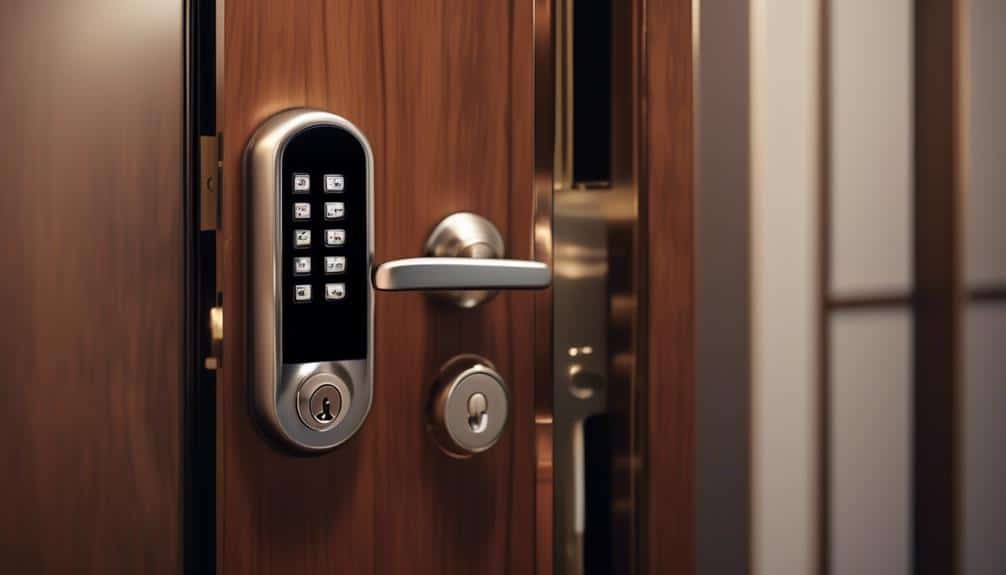When it comes to ensuring the security and peace of mind of hotel guests, it goes without saying that the selection of a proper door lock is of utmost importance.
In the ever-evolving world of technology, there are several options available that provide a seamless blend of convenience and safety. From the subtle sophistication of biometric locks to the sleek efficiency of electronic keypad locks, the choices are vast and varied.
But which ones truly stand out from the rest? In this discussion, we will explore the top five hotel room door locks that have garnered praise for their reliability, ease of use, and cutting-edge features.
So, let's unlock the door to a world of security and discover the best options available.
Biometric Locks
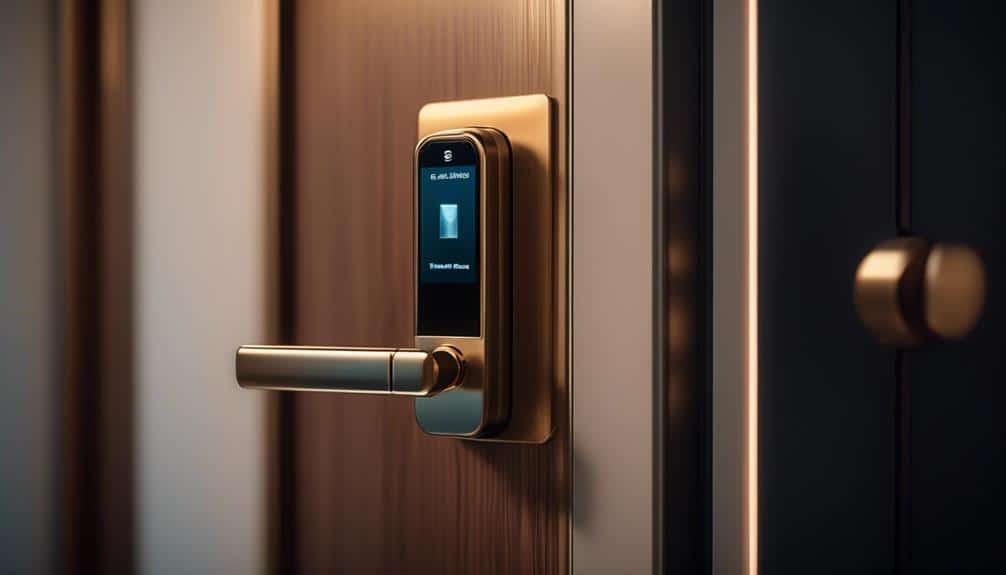
We highly recommend using biometric locks as they provide an advanced and secure method of accessing hotel room doors. Biometric lock advantages include increased security and convenience. Unlike traditional locks, which can be easily picked or keys lost or stolen, biometric locks utilize unique individual characteristics, such as fingerprints or iris scans, to grant access. This eliminates the need for physical keys or access codes, reducing the risk of unauthorized entry.
Biometric locks offer a higher level of security compared to other types of locks. The use of biometric data ensures that only authorized individuals can gain entry, as it's nearly impossible to replicate someone's fingerprint or iris pattern. This significantly reduces the chances of break-ins or theft, providing peace of mind for hotel guests. Moreover, biometric locks eliminate the need for guests to carry around keys or remember access codes, making it convenient and hassle-free.
However, there are limitations to biometric locks. One limitation is the potential for false negatives or false positives. In some cases, the system may not recognize a valid fingerprint or iris scan, preventing entry for authorized users. On the other hand, there's also a chance of false positives, where the system incorrectly identifies someone as an authorized user. Additionally, biometric locks may be more expensive to install and maintain compared to traditional locks.
Despite these limitations, biometric locks offer numerous advantages in terms of security and convenience. Their advanced technology makes them a worthy investment for hotels looking to enhance guest safety and improve overall guest experience.
Electronic Keypad Locks
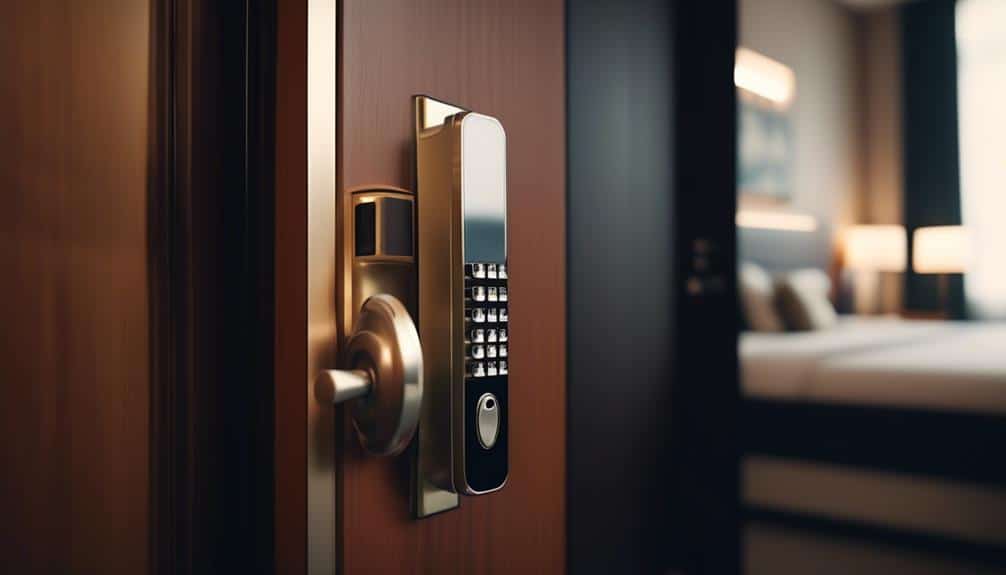
After exploring the advantages of biometric locks, let's now turn our attention to electronic keypad locks as another secure option for hotel room door access.
Electronic keypad locks have gained popularity due to their convenience and reliability. One of the key features of these locks is their wireless connectivity options. With wireless connectivity, hotel staff can easily update access codes remotely, eliminating the need for physical keycards or manual reprogramming. This not only saves time but also enhances security by reducing the risk of lost or stolen keycards.
Moreover, electronic keypad locks have also integrated smartphone apps, making them even more user-friendly. Guests can now use their smartphones to unlock their hotel room doors, eliminating the need for physical keys or access cards altogether. This integration also allows for seamless check-in and check-out processes, as guests can receive their access codes directly on their smartphones.
The integration of smartphone apps with electronic keypad locks also provides an added layer of security. In case of any suspicious activity, hotel staff can remotely monitor and control access to guest rooms, ensuring the safety and privacy of all guests.
Magnetic Stripe Card Locks
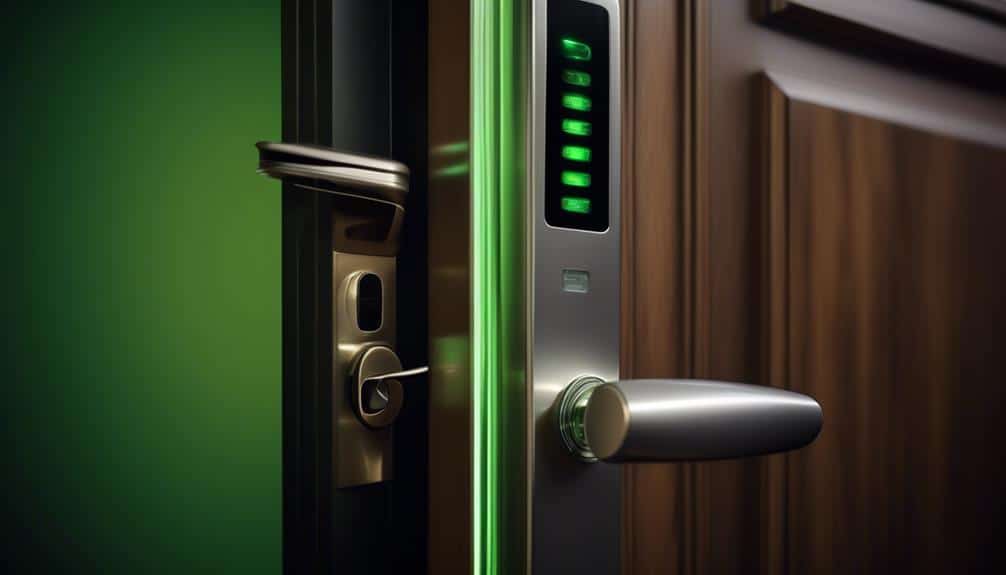
Magnetic stripe card locks offer a reliable and widely-used method for accessing hotel room doors. These locks use a magnetic stripe card that contains the necessary information to unlock the door. The card is swiped through a card reader, which then verifies the information and grants access to the room.
One advantage of magnetic stripe card locks is their integration with hotel management systems. These locks can be easily programmed to work with the hotel's computer system, allowing for seamless integration with keycard management, room assignment, and guest check-in and check-out processes. This integration ensures that the hotel can efficiently manage and monitor access to its rooms.
However, it's important to note that magnetic stripe card locks have security vulnerabilities. The magnetic stripe technology used in these locks is susceptible to cloning and unauthorized access. Criminals can use card skimmers or other techniques to copy the card's information and gain entry to hotel rooms. To mitigate these risks, hotels must regularly update their lock systems, use encryption technology, and implement strict access control policies.
RFID Locks
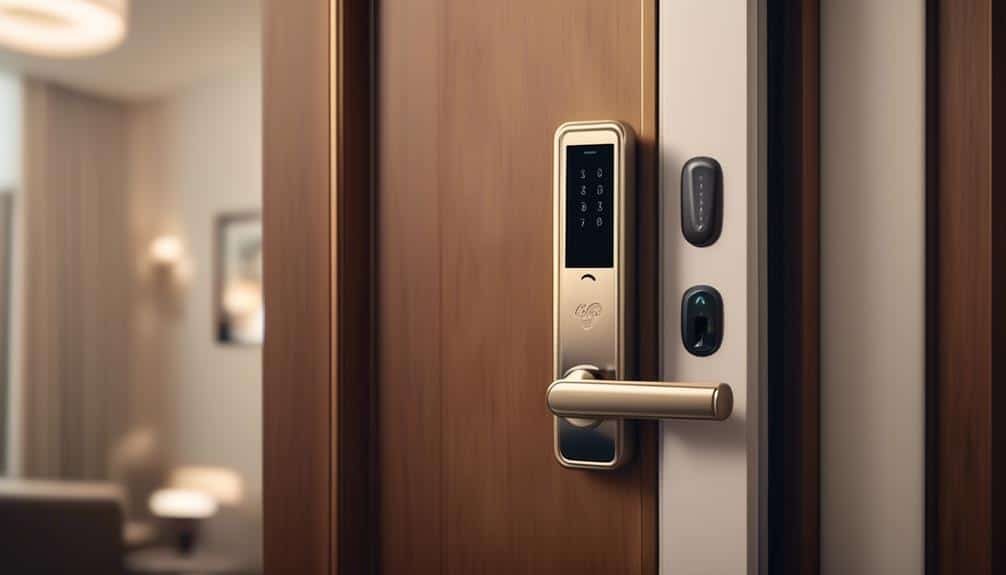
RFID locks provide a secure and efficient method for accessing hotel room doors. These locks use radio frequency identification technology to grant access to authorized individuals. Here are the benefits of using RFID locks and the advancements in RFID lock technology:
- Enhanced Security: RFID locks offer a higher level of security compared to traditional key locks or magnetic stripe card locks. They're difficult to duplicate, reducing the risk of unauthorized access to hotel rooms.
- Convenient Access: With RFID locks, guests can access their rooms easily by simply tapping or waving their RFID keycards near the lock. This eliminates the need for physical keys or swiping cards, making the process faster and more convenient.
- Integration with Other Systems: RFID lock technology can be integrated with other hotel systems, such as the property management system or access control systems. This allows for seamless integration and efficient management of guest access.
- Increased Durability: Advancements in RFID lock technology have led to the development of more durable locks. These locks are designed to withstand wear and tear, ensuring long-term reliability.
- Real-time Tracking: Some RFID locks have the capability to track the movement of guests within the hotel. This allows hotel management to monitor guest activities for security purposes or to provide personalized services.
Keyless Entry Locks
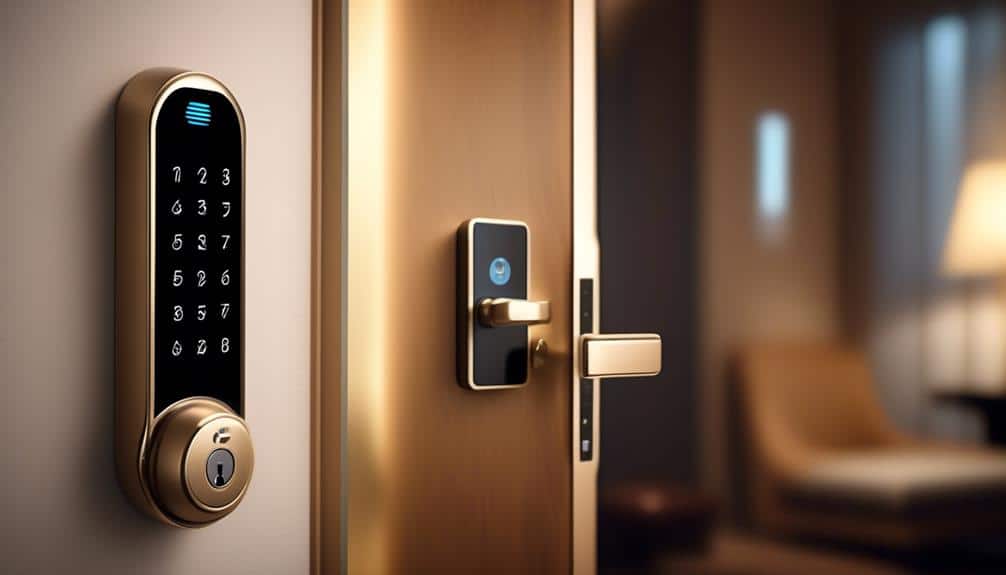
Now let's explore the convenience and security offered by keyless entry locks, the next evolution in hotel room door lock technology. Keyless entry locks eliminate the need for traditional keys, providing a hassle-free experience for hotel guests. These locks can be operated using various methods, including Bluetooth-enabled locks and facial recognition locks.
Bluetooth-enabled locks utilize the Bluetooth technology to connect to a guest's smartphone, allowing them to unlock their hotel room door with just a tap on their phone. This eliminates the need for physical keys or keycards, providing a seamless and convenient experience for guests. With Bluetooth-enabled locks, guests can also receive notifications on their phones when their room is ready or when housekeeping has completed their service.
Facial recognition locks, on the other hand, use advanced biometric technology to grant access to hotel rooms. By scanning the guest's face, these locks can verify their identity and grant them entry. This eliminates the risk of lost or stolen keys, providing enhanced security for both guests and hotel staff.
Here is a comparison table showcasing the features and benefits of Bluetooth-enabled locks and facial recognition locks:
| Lock Type | Features and Benefits |
|---|---|
| Bluetooth-enabled | – Convenient smartphone operation |
| – Real-time notifications | |
| – Eliminates the need for physical keys or keycards | |
| Facial recognition | – Enhanced security through biometric verification |
| – Eliminates the risk of lost or stolen keys | |
| – Quick and seamless access to hotel rooms |
Frequently Asked Questions
What Is the Average Lifespan of a Biometric Lock and How Often Does It Need Maintenance?
On average, the lifespan of a biometric lock is around 7-10 years, depending on usage and maintenance. Regular maintenance is crucial to ensure optimal performance and longevity.
Common issues with biometric locks include sensor malfunctions, software glitches, and power failures.
It's recommended to have the lock inspected and serviced annually to prevent any potential problems.
Taking proper care of biometric locks will help ensure their reliability and security for years to come.
Can Electronic Keypad Locks Be Easily Hacked or Tampered With?
Electronic keypad locks have potential vulnerabilities and security risks. Hackers may attempt to exploit weaknesses in the lock's programming or tamper with the physical components.
However, it's important to note that not all electronic keypad locks are easily hacked or tampered with. Manufacturers are continuously improving the security features of these locks to mitigate potential risks.
Regular maintenance and software updates can also help enhance the security of electronic keypad locks.
Are Magnetic Stripe Card Locks Susceptible to Demagnetization or Wear Over Time?
Magnetic stripe card locks can be susceptible to demagnetization or wear over time. To prevent this, proper magnetic stripe card lock maintenance is crucial.
Regularly inspecting and cleaning the card reader, ensuring the cards aren't subjected to strong magnetic fields, and avoiding physical damage can help prevent demagnetization.
Additionally, using high-quality cards with durable magnetic stripes can reduce the risk of wear.
Implementing these demagnetization prevention techniques is essential to maintain the effectiveness and reliability of magnetic stripe card locks.
How Secure Are RFID Locks Against Unauthorized Access?
Using RFID locks for hotel room doors has both pros and cons.
On the positive side, RFID locks offer convenience and ease of use for guests, as they simply need to wave their key card near the reader to gain access. Additionally, these locks are more resistant to wear and tear compared to traditional magnetic stripe card locks.
However, there are concerns about the security of RFID locks, as they can be vulnerable to unauthorized access if the technology isn't properly implemented. To prevent this, hotels should ensure they have robust encryption protocols in place and regularly update their security systems.
What Is the Process for Granting and Revoking Access With Keyless Entry Locks?
Granting and revoking access with keyless entry locks is a seamless process. We can remotely grant access to authorized individuals, ensuring convenience and efficiency. With just a few clicks, we can instantly revoke access, guaranteeing security and peace of mind.
This streamlined approach eliminates the need for physical keys and allows for immediate control over who enters the premises. It's a modern solution that enhances both guest experience and overall safety.

